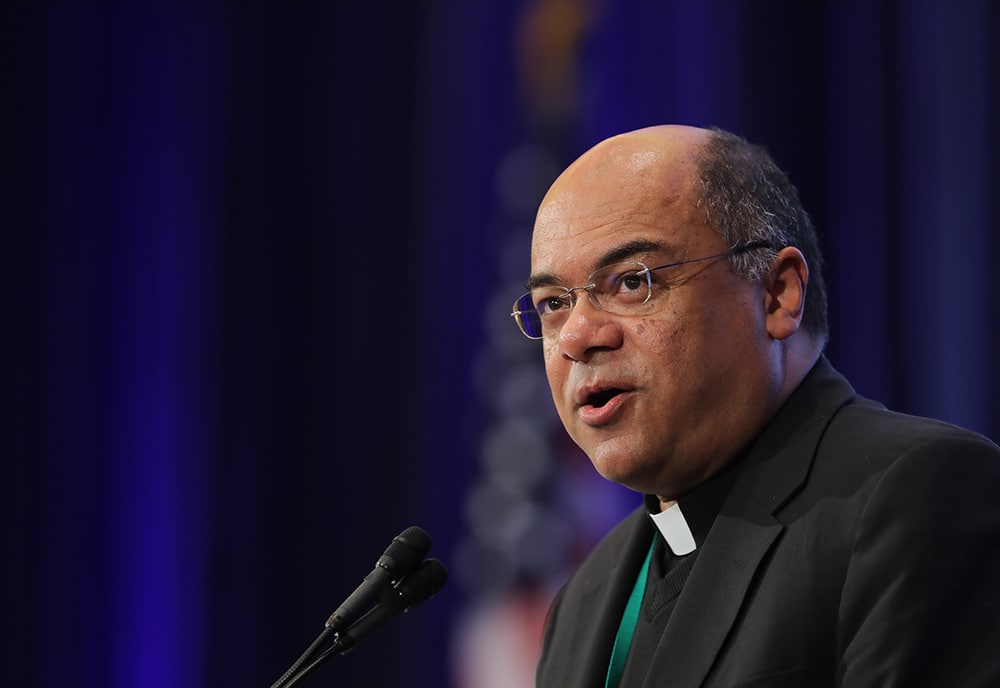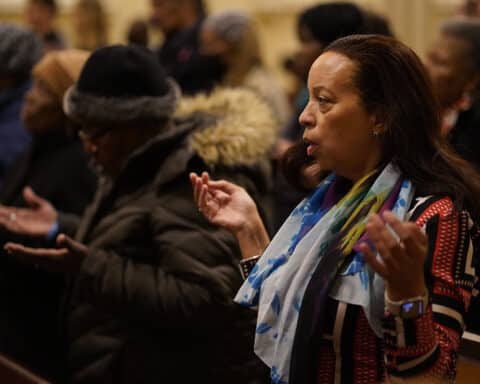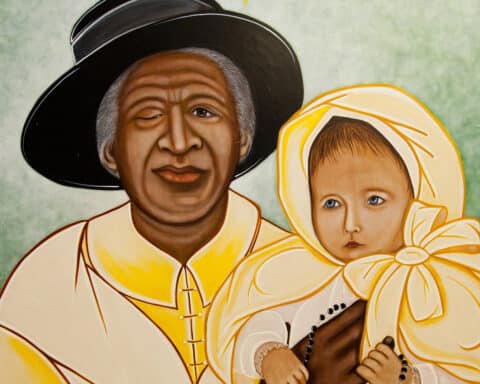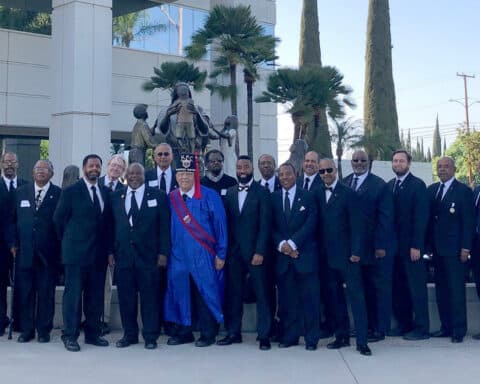The first Catholic bishop in Louisville, Kentucky, owned slaves. Some of the priests and lay faithful were slave owners. In front of the cathedral in downtown Louisville is a statue of Mother Catherine Spalding, co-foundress of the Sisters of Charity of Nazareth, a local religious order that owned slaves.
“We have a lot to make up for in this diocese,” said Father Patrick Delahanty, a retired priest of the Archdiocese of Louisville and a former executive director of the Catholic Conference of Kentucky.
Last year, Father Delahanty sent a four-page letter to his fellow priests in which he presented his idea of forming an archdiocesan “truth and reconciliation” committee that would apologize and offer reparations for the local Church’s involvement in slavery and its complicity in racism. His letter spurred an archdiocesan ministry to hold a community discussion on reparations this year ahead of Martin Luther King Jr. Day.
“Until we take seriously this sin of racism, actually confess it and admit it, the white Catholic community in this archdiocese has not owned up to its sin,” Father Delahanty told Our Sunday Visitor. “Some of the churches they worship in — to this day — were built with slave labor.”
Celebrating diversity
In Louisville and elsewhere, the Catholic Church in the United States is wrangling with its complicated history and mixed legacy on slavery and racial discrimination. And with Black History Month being celebrated in February, many dioceses are sponsoring events, special liturgies, retreats and conferences to celebrate the culture, history and heritage of the country’s black Catholic community.
“We’re formulating programming that emphasizes the role of African-Americans in the Church, historically and currently, and we’re also looking to do a series of programs that serve as history lessons, not just for Black History Month but throughout the year,” said Ashley Morris, the associate director of the Office of Intercultural Ministries for the Archdiocese of Atlanta.
In January, Morris’ office organized a young adult service project, a special Mass and a youth celebration to honor Martin Luther King Jr.
“We have more in common with Dr. King and his legacy than just being in the same city that he was born and raised in,” Morris told Our Sunday Visitor. “What resonates with Catholics now and for us today is not just his message of bringing people together but also looking at justice from a Christ-centered lens and what that looks like for us as brothers and sisters in Christ. That is far more important than the stuff that we believe separates us.”
Ahead of Martin Luther King Jr. Day, Archbishop José H. Gomez of Los Angeles, president of the U.S. Conference of Catholic Bishops, released a statement saying that “too many hearts and minds are clouded by racist presumptions of privilege and too many injustices in our society are still rooted in racism and discrimination.” Racism, he wrote, “is a sin that denies the truth about God and his creation, and it is a scandal that disfigures the beauty of America’s founding vision.”
Several Catholic organizations, including the bishops’ conference, the United States Catholic Mission Association, the National Federation for Catholic Youth Ministry and the Catholic Mobilizing Network, have collaborated on webinars dedicated to highlighting the themes in the bishops’ 2018 document “Open Wide Your Hearts: The Enduring Call to Love, A Pastoral Letter Against Racism.”
The webinars have attracted hundreds of people online for discussions on the pastoral letter and for a conversation on how Jesuit institutions that owned slaves, such as Georgetown University, have sought to facilitate reconciliation with their descendants. On Feb. 12, the Catholic ministry leaders are scheduled to host a webinar discussion on the film “Just Mercy,” which tells the true story of a young lawyer who fought to exonerate a black man who was convicted and sentenced to death in Alabama for a crime he didn’t commit.
USCCB committee
For about a year and a half, a committee from the USCCB has held listening sessions around the country to hear people of color share their stories of how they have experienced racism in the Church. In one session, a black Catholic woman recalled how a priest at Mass looked at her and asked, “What do you want?” when she went to receive Communion.
“People have really been wounded. And it’s causing a large rift in our Catholic community. It’s a scandal before God,” said Danielle Brown, who staffs the U.S. Conference of Catholic Bishops’ Ad Hoc Committee Against Racism, which was established in August 2017 and is chaired by Bishop Shelton Fabre of Houma-Thibodaux, Louisiana.
“I’m proud of the very existence of the committee, because I think it shows the bishops are striving to take this very important issue very seriously,” said Bishop Fabre, who added that he has seen progress in how the Church talks about racism.
“I find there is more of an awareness to talk about (racism) on the part of my brother bishops,” Bishop Fabre said. “I find that things are moving forward and going well. Some would say it’s not fast enough, and others would say it’s going too fast, but I’m very happy with where we are.”
Moving forward
Some observers, however, believe the bishops’ statements on racism since the 1940s have had minimal impact because, they argue, Church leaders have not backed up their words with bold, concrete plans that risk alienating white Catholics who fill the pews and sign the checks.
“It’s a hard conversation to have, and nobody really wants to have it. It takes work and effort, and it takes will, and in the process, you may lose some of your big donors,” said Father Delahanty, who criticizes the bishops for not fulfilling a promise they made in “Brothers and Sisters to Us,” their 1979 pastoral statement on racism, to expand Catholic education in minority neighborhoods.
“To this day, young black Catholics and others have little access to our school system,” Father Delahanty said.
Darren Davis, a political science professor at the University of Notre Dame, told Our Sunday Visitor that he doesn’t believe the bishops’ most-recent pastoral letter has been effective because, he argues, it doesn’t present specific challenges to the laity or describe in detail what Catholics should be doing on racism.
“The clergy is somewhat diverse, but they don’t have the training, the background or the expertise to talk on race issues,” said Davis, the co-author of a 2011 report, sponsored by Notre Dame and the National Black Catholic Congress, that offered insights into the spiritual needs of black Catholics.
“We’ve been talking about this for quite some time,” Davis said. “By now, the Church should have evolved to the point where there is training and more information, not just listening. There is so much rich history among black Catholics.”
However, Morris, with the Archdiocese of Atlanta, said the pastoral letter has “reopened the doors” in the Church to having conversations about racism, which he said had not been a high priority for quite some time. He also said the letter’s theme of racial reconciliation is vitally important. Morris recalled something a survivor of the 1994 genocide in Rwanda told him.
“She told me, ‘Reconciliation cannot happen if one side is not ready to admit their culpability in the problem and apologize, and if the other side is not willing to accept that apology without prerequisites,'” Morris said. “That was powerful to me, and I take that everywhere I go.”
Brian Fraga is a contributing editor for Our Sunday Visitor.
| ‘EVERYONE BELONGS’ |
|---|
 The USCCB’s Ad Hoc Committee Against Racism announced in late January that it had partnered with Loyola Press to publish a new children’s book, “Everyone Belongs” ($8.95), which was written to help young readers have conversations about racism. The book tells the story of a boy whose family fled violence in their home country and settled in the United States as refugees, only to experience bigotry in their new neighborhood. The USCCB’s Ad Hoc Committee Against Racism announced in late January that it had partnered with Loyola Press to publish a new children’s book, “Everyone Belongs” ($8.95), which was written to help young readers have conversations about racism. The book tells the story of a boy whose family fled violence in their home country and settled in the United States as refugees, only to experience bigotry in their new neighborhood.
Danielle Brown, who staffs the committee, told Our Sunday Visitor that the book is inspired by the bishops’ 2018 pastoral letter “Open Wide Our Hearts: The Enduring Call to Love, A Pastoral Letter Against Racism.” “We really wanted a vehicle for children that was a little more cohesive than the materials we already have on our website,” said Brown, who referred to the committee’s online study guides and other resources. Bishop Shelton Fabre of Houma-Thibodaux, Louisiana, oversaw the book’s production and said that “Everyone Belongs” is primarily about recognizing the image of God in all people, valuing differences, righting wrongs and forgiveness. To order, visit loyolapress.com/everyonebelongs. |





